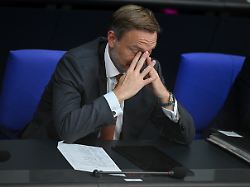Too high interest and social expenses
Lindner struggles with “composition of government spending”
September 12, 2023, 8:42 p.m
Listen to article
This audio version was artificially generated. More info | Send feedback
Federal Finance Minister Lindner pats himself on the back. After years of massive government crisis aid, the budget turnaround has been successful. But he wants to make further adjustments. He also rejects any further spending requests and refers to the upcoming repayment of the Corona debts.
According to Federal Finance Minister Christian Lindner, the public deficit in Germany will already fall below the limit of three percent of gross domestic product (GDP) set in the Maastricht Treaty this year and will fall further to two percent or even lower next year. “We have now succeeded in turning the fiscal trend around with the 2024 budget that the federal government has presented,” said Lindner at a discussion event at the Finance Ministry. “We still have a long way to go in terms of quality, because I’m not convinced by the composition of government spending.” There are too high interest expenses and increasing social spending, which is not yet the composition of the budget that will be necessary in the future. “So we have to continue the qualitative consolidation.”
Lindner added that he wanted a moderately restrictive financial policy with falling deficit and debt ratios. In addition, there should be no new tax burdens. A priority is to keep investments at record levels. From 2028, the government must begin to pay off special debts from the corona pandemic. This will limit the scope for debt, so that almost balanced budgets will then be necessary. Accordingly, the state must forego additional and long-term additional expenditure and stimulate the economy by foregoing bureaucracy.
With a view to the discussion about an industrial electricity price, Lindner confirmed that he viewed such a price as “extremely skeptical in terms of regulatory policy.” The funds not needed to finance the electricity and gas price cap in the Economic Stabilization Fund are not available for this purpose because the legal purpose is clearly defined. “We will need far less than the 200 billion,” predicted Lindner. “We simply won’t take on the 140 billion euros that we don’t need as additional debt,” he made it clear. “These credit authorizations are simply unused and will expire.”
However, Lindner was open to an extension of the peak tax compensation for energy-intensive companies, which is actually supposed to be canceled. It is “a bit paradoxical” to discuss an industrial electricity price and, on the other hand, make energy even more expensive for the companies affected. “I would be prepared to say, okay, extending it again for another year or two could be something,” emphasized the Finance Minister. Although he didn’t immediately know where the money would come from, the amount could still be “managed” in the federal budget.
